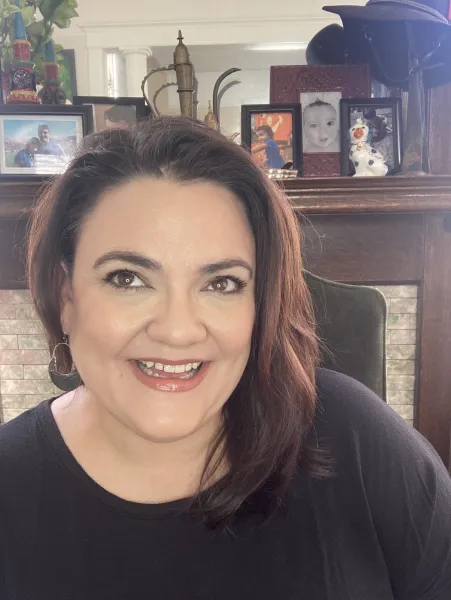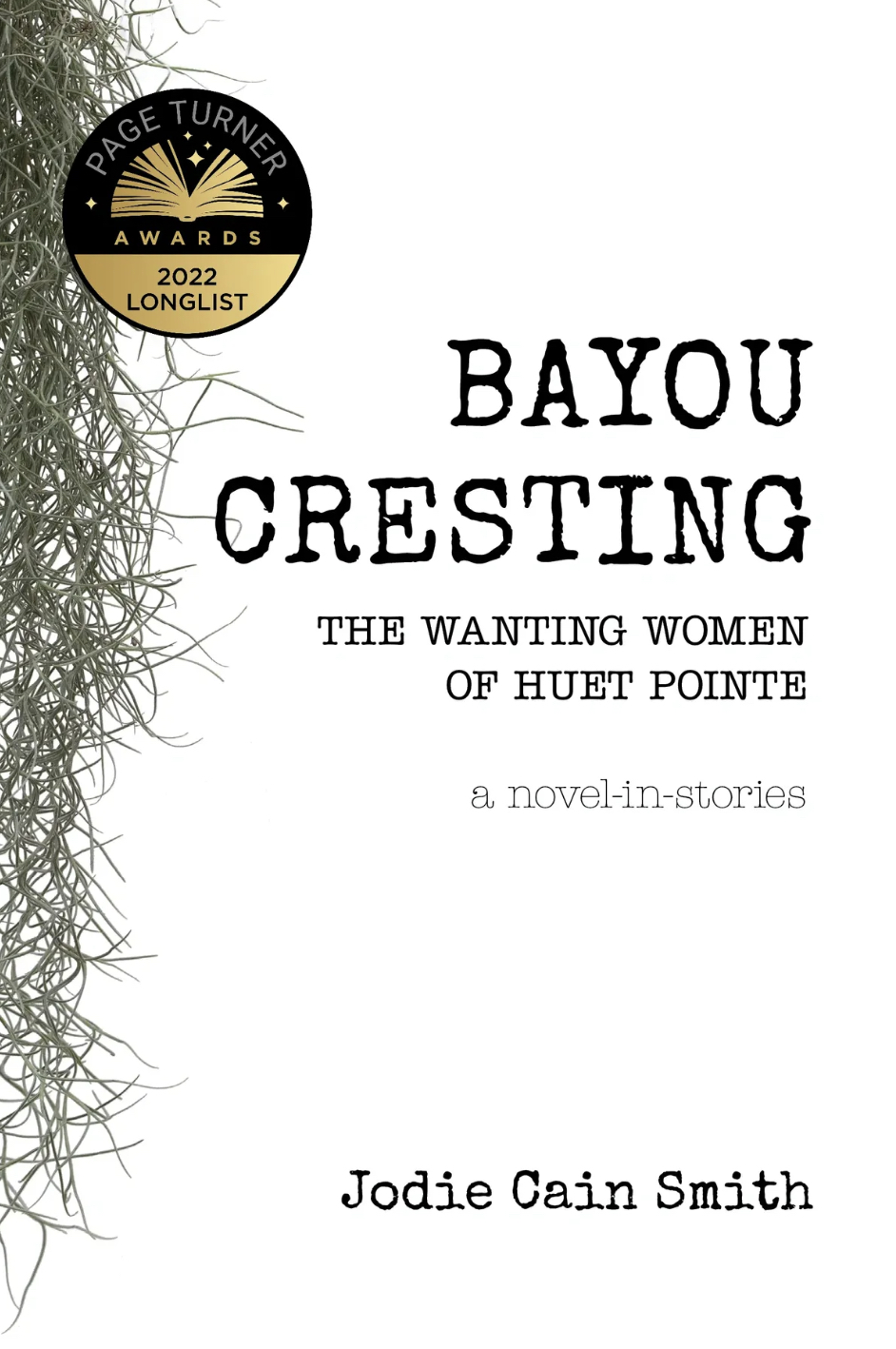Northern Michigan University alumna Jodie Cain Smith has garnered international recognition for her writing. The United Kingdom-based Page Turner Awards, dubbed the “Rolls Royce” of writing award programs, selected her published novel Bayou Cresting: The Wanting Women of Huet Pointe for adaptation to a feature film screenplay in late 2022. The book also won for Best Anthology & Compilations.
Bayou Cresting tells the stories of 10 women brought together by proximity and forever entangled by the actions they take. The description reads: “The women of this antebellum hamlet yearn for more than society insists they be—devout, feminine, and content with living according to cultural norms—but in Huet Pointe, ambition is as dangerous as the brackish water that surrounds the sliver of land. So, what's a girl to do? She could employ poison, perhaps a bit of adultery, and drowning in alligator-infested waters is always a choice—whatever it takes to achieve her goal.”
A producer is interested, Smith said, and her novel has been passed to a screenwriter. A book adaptation is the first step for authors who dream of seeing their story turned into a movie for theatrical release and/or play on streaming services. But because not all novelists are well-versed in script writing, paying professional screenwriters and editors can be expensive and beyond reach. The Page Turner Awards program helps to facilitate the process. Smith entered Bayou Cresting and the judges determined it was among the top three books most cinematically suited to being adapted. She said it boosted her spirits to be chosen along with writers from Hollywood who entered the contest, including actor Shia LaBeouf, who won the Screenplay Film Script Award and representation from a Los Angeles entertainment firm.
“Winning was a great honor, especially with so many entries from talented writers in the running,” said Smith, who completed a master of arts in education in school counseling at NMU in 2008. “I was thrilled that the judges connected with my work and the quirky, angry women in my novel. It is a rare and amazing feeling to actually receive something you desperately want. Now that I have my screenplay in hand, I am looking for opportunities to pitch it as a feature film to producers, literary agents and streaming platforms. But my options don't end there. This award gave me the courage to write and pitch Bayou Cresting as a limited series to streaming platforms. An unexpected bonus was the sales bump my novel received in the weeks after the award announcement.
“Honestly, that novel came out of my incredible frustration in 2016-2017 of feeling so unheard, unseen and uncared for in this country as a woman; I just had to get all of that out,” she said. “What I did with that, frustration, anger and sometimes rage was to invent these 10 women and what each wants, and all of their lives kind of intersect. I decided they were not going to be constrained by what society expects of them or morality or anything like that. They were going to be brave enough to go for what they want and kind of tell the rest of the world to be damned.”
Her first Southern Gothic novel, The Woods at Barlow Bend, earned Smith a place on the Page Turner Awards longlist. It takes place during the Great Depression and revolves around a 14-year-old girl who becomes a mother to her three siblings after her mother is killed and her father stands accused of her murder. Smith is also the author of 100 Things to Do in Mobile Before You Die, a guide to the Alabama city where she and her family reside. Her short works can be found in Pieces Anthology, The Petigru Review, and Chicken Soup for the Military Spouse's Soul.
Smith recalls that her decision to become a writer originated in early April 2003. For a three-week period, she had passed Iraq War protesters waving signs and shaking their fists along Veterans' Drive in Savannah, Ga. Her husband was with the 3rd Infantry Division stationed near Baghdad, Iraq, and it had been nearly eight weeks since she'd heard his voice.
“I was struggling with being a tough Army wife, exhausted from worry and angry with everyone and everything around me,” she wrote on her website. “I needed somewhere to place my anger and fear. I parked in front of the Savannah Morning News office and marched into the lobby as a woman on a mission. ‘You are giving the protesters a lot of coverage, but no one is speaking for the soldiers' families. Our story matters, too,' I loudly accused the first man I saw. ‘Why don't you write it then?' was his response. I said, ‘Fine! I will!'
For 13 months, Smith wrote a column titled “Married to the Military.” When her husband, now retired from the Army, was assigned to teach in the ROTC program at NMU, Smith decided to pursue a graduate degree. Her academic experience involved a great deal of writing, which forced her to solidify that skill.
“I don't think I really knew how to follow all the rules of writing, like grammar, citations and writing in active voice rather than passive voice, until my master's degree. I was determined to have excellent grades the whole time, so I worked really hard on it. What that has allowed as a fiction writer is that I now know the rules well enough to the point I can break them. Fiction writing is rarely 100% grammatically correct, especially since my style of writing is very conversational. If it weren't for being graded on knowing all the rules and making sure everything was grammatically and scientifically correct, I don't think I would be able to break the rules as well as I do.”
Smith said her practice therapy sessions and 600-hour internship at Marquette Senior High School required as part of her counseling degree helped her better understand character development, particularly as it relates to the struggles teenagers face. She also incorporates material drawn from her experiences in Marquette into her writing.
“Living in Marquette and being from the Gulf Coast—never having seen real snow or moose before—was such a culture shock. It was a really good eye-opening experience for me because it broadened my knowledge base, so to speak. I've actually written one short story about a Southern woman who loses her mind because of the weather in Marquette. So that was obviously taken from a little bit of my own experience there.”
Smith has been sharing a new manuscript for a novel with publishers. She began writing it in 2013, when her husband was still involved in the Iraq war. The decade of fighting made her question what living in a constant state of civil unrest would be like. In her research, Smith came upon white supremacist groups and pocket militias, which inspired a novel following a woman in her 30s who had to move to Mobile Bay, Ala., and live in a family compound in the wake of civil unrest.
“When I first workshopped it with my writers, everyone thought this would never happen. You know, the United States is never going to enter into another civil war or anything like that. Then in 2020, when it seemed like the world was falling apart around us, or at least the United States was, I pulled it back out and started working on it again. And then Jan. 6 happened, and I'm watching this book unfold in front of me with everyone just going after each other. It's freaky to watch what I feared and imagined, little bits of it playing out. I don't write with a goal of affecting social change. Sometimes it's in the aftermath of a book.”
Smith is the founder of the Mobile Literary Festival and an event coordinator for The Haunted Book Shop in the city. She advises aspiring writers to be persistent with drafts, revisions, sending pages out and even dealing with rejection because it's all progress toward a goal. She also recommends finding a writers' group that will honestly and kindly critique each other's work.
For more on Smith and her projects, visit jodiecainsmith.com.
Prepared by Kristi Evans and student writer Julia Seitz.


